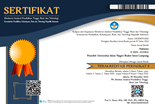Social Motives and Group Commitment on Volunteer Involvement in Five Social Communities in The City of Bandar Lampung
Abstract
Abstract
Volunteers are people who decide to be involved in volunteering activities based on careful calculation. The activities by volunteers are voluntary and without expecting external rewards. The population in the study came from five social communities in Bandar Lampung: 1) Jendela Lampung Community, 2) Komunitas Peduli Generasi with Yayasan Rumah Singgah Peduli Lampung, 3) Komunitas Sedekah Lampung, 4) Komunitas Berbagi (Kombi), and 5) Itera Mengajar. From these five social communities, the researchers obtained a population of 202 volunteers. The researchers obtained a sample of 60 volunteers through purposive sampling techniques and screening. This study employed Likert scales data collection method, which includes a volunteer involvement scale, a social motive scale, and a group commitment scale. The data were analyzed using two predictor multiple regression analysis techniques assisted by the JASP 0.16.1.0 program for Windows. The results showed that the correlation value (r) was 0.337 with a significant p-value of 0.041 (p-value smaller than 0.05). The hypothesis is accepted; therefore, a significant relationship exists between social motives and group commitment on volunteer involvement. The R2 value of 0.155 states that the two independent variables effectively contribute 15.5%.
Keywords: Volunteer Involvement, Social Motives, and Group Commitment
Full Text:
PDFReferences
Allen, N. J and Meyer, J. P. 1990. The Measurement and Antecedents of Affective, Continuance and Normative Commitment to the Organization. Journal of Occupational Psychology. Vol 63 (1), pp. 1-18.A.M. Sardiman (2012). Interaksi dan Motivasi Belajar. Jakarata : Raja Grafindo Persada
Clary, et al., (1998). Understanding and Asessing The Motivations of Volunteers: A Functional Approoach, Journal of Personality and Social Psychology, 74(6), 1516-1530
Fitroh, R., Oktavia, W. K., & Hanifah, H. (2019). Perbedaan perilaku prososial ditinjau dari jenis kelamin pada relawan sosial. Jurnal Psikologi Terapan dan Pendidikan, 1(1), 9. https://doi.org/10.26555/jptp.v1i1.15125
Hurlock, E.B. (2003). Psikologi Perkembangan. Jakarta. Penerbit Erlangga
Irawan, Susilowati, dan Silviandari. (2011). Hubungan Kohesivitas Kelompok Dengan Job Involvement Dan Sosial Loafing Pada Anggota Kelompok (Studi Pada Karyawan Kantor Induk PLNUIP VIII, Surabaya). Jurnal Psikologi Universitas BrawijayaMalang Vol.2, No.2.
Nave, A. C. & Paco, A. (2013). “Corporate Volunteering An Analysis Of Volunteers Motivations And Demographics”. Journal of Global Responsibility. Vol.4 No.1
Pangestu, Jangkung. P. (2016). Hubungan Motivasi dan Kepuasan Relawan pada Organisasi Seni. Tata Kelola Seni: Vol.2 No.2
Pratiwi, E. D., Sunarto, & Sabandi, M. (t.thn.). Pengaruh Motivasi Fungsional Terhadap Minat Mahasiswa Menjadi Volunteer Pendidikan di Solo Mengajar. Solo.
Priebe, S., Chevalier, A., Hamborg, T., Golden, E., King, M., & Pistrang, N. (2020).
Effectiveness of a volunteer befriending programme for patients with schizophrenia: Randomised controlled trial. British Journal of Psychiatry, 217(3), 477–483. https://doi.org/10.1192/bjp.2019.42
Santrock, J. W. (1999). A topical approach to life span development. New York : McGrawHill Companies, Inc.
Schaufeli, Wilmar & Arnold Bakker. 2004. UWES, Utrecht Work Engagement Scale Preliminary Manual Version 1.1. Netherland: Occupational Health Psychology Unit Utrecht University
Schultz, D.P., And Schultz, S.E. (1998). Psychology and Work Today an Introduton to Industrial and Organizational Psychology. USA Meridien by Pine Tree Composition Inc:By Courier Companies.
Widjaja, Emmeline. (2010). “Motivation Behind Volunteerism”. CMS Senior Theses.
Zanbar, L. (2019). The Effect of Volunteering for Community Activity on the Social Resources of Low-SES Residents: Differences Between Volunteer Community Activists and Other Residents. Voluntas, 30(1), 164–174. https://doi.org/10.1007/s11266-018-00
DOI: http://dx.doi.org/10.24042/00202361658600
Refbacks
- There are currently no refbacks.
Copyright (c) 2023 ANFUSINA: Journal of Psychology













